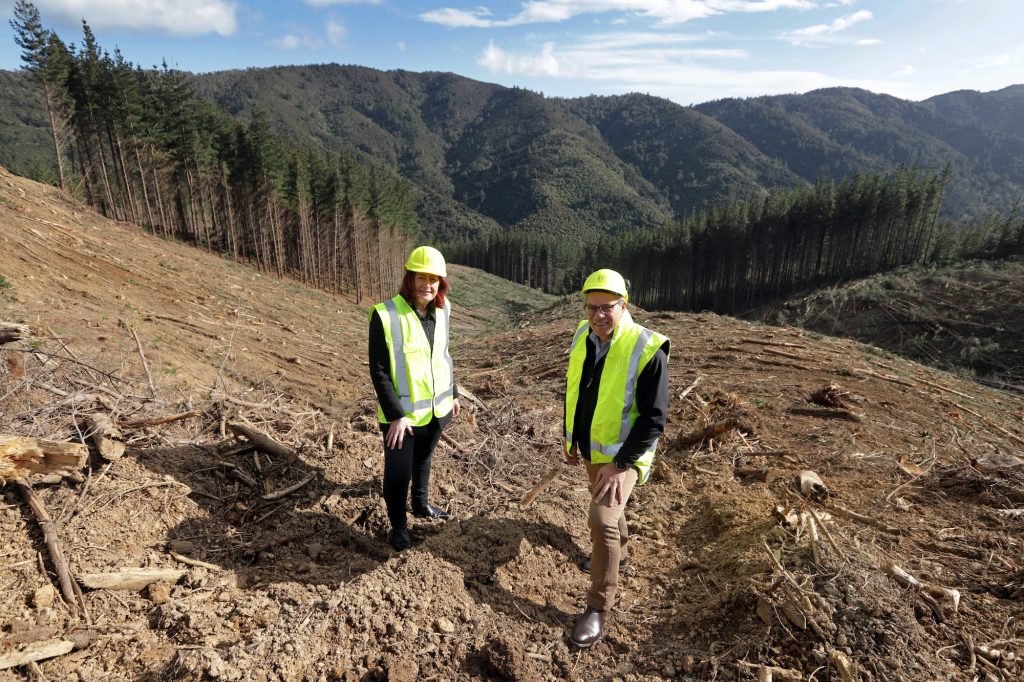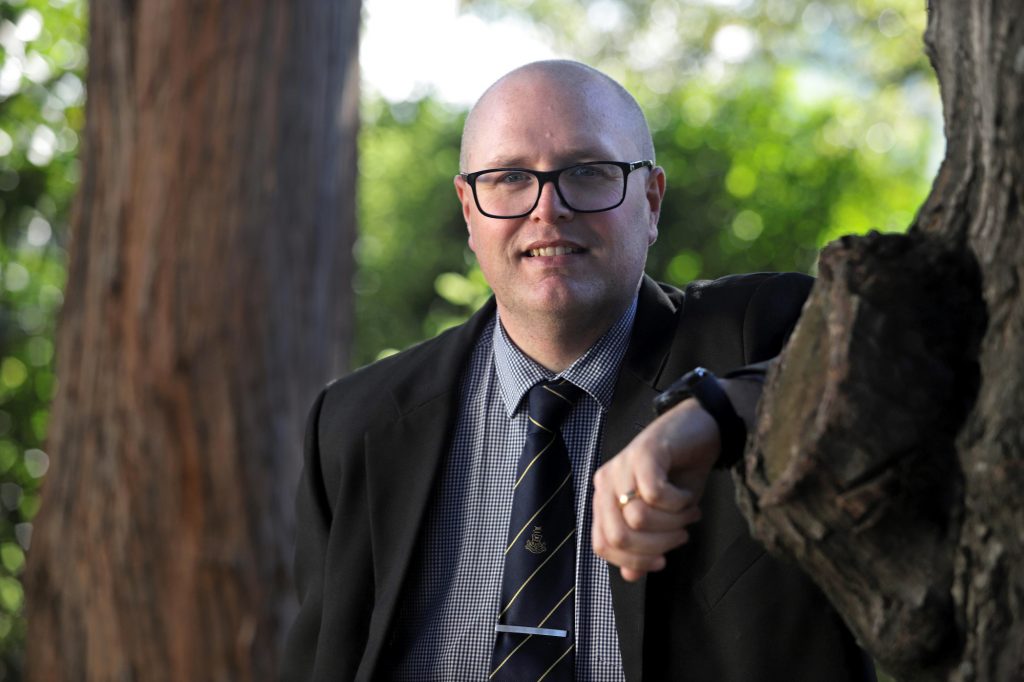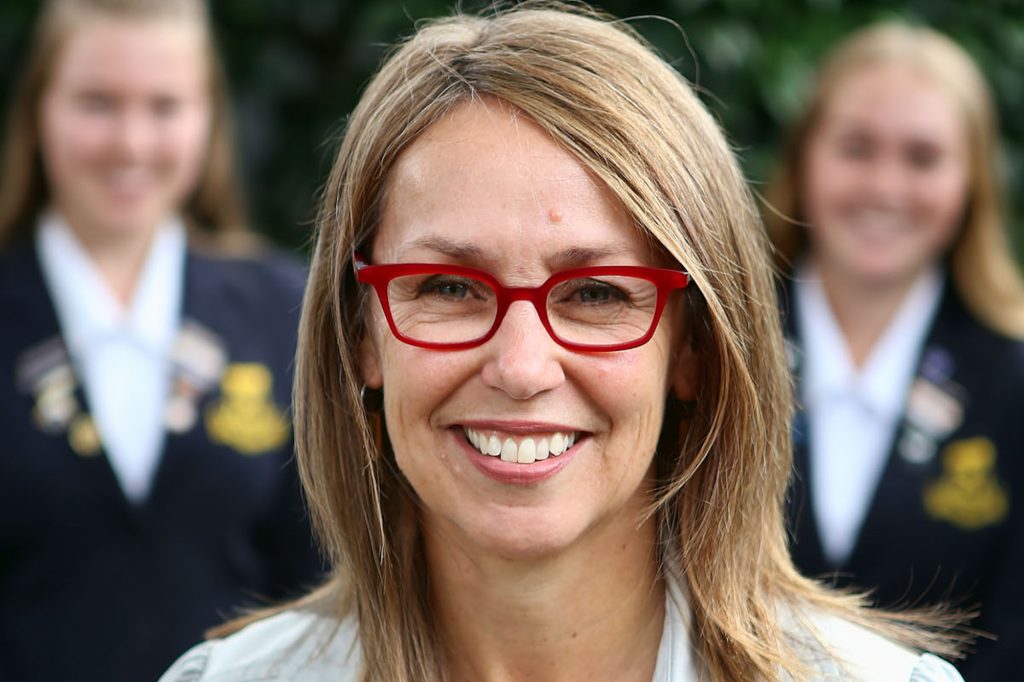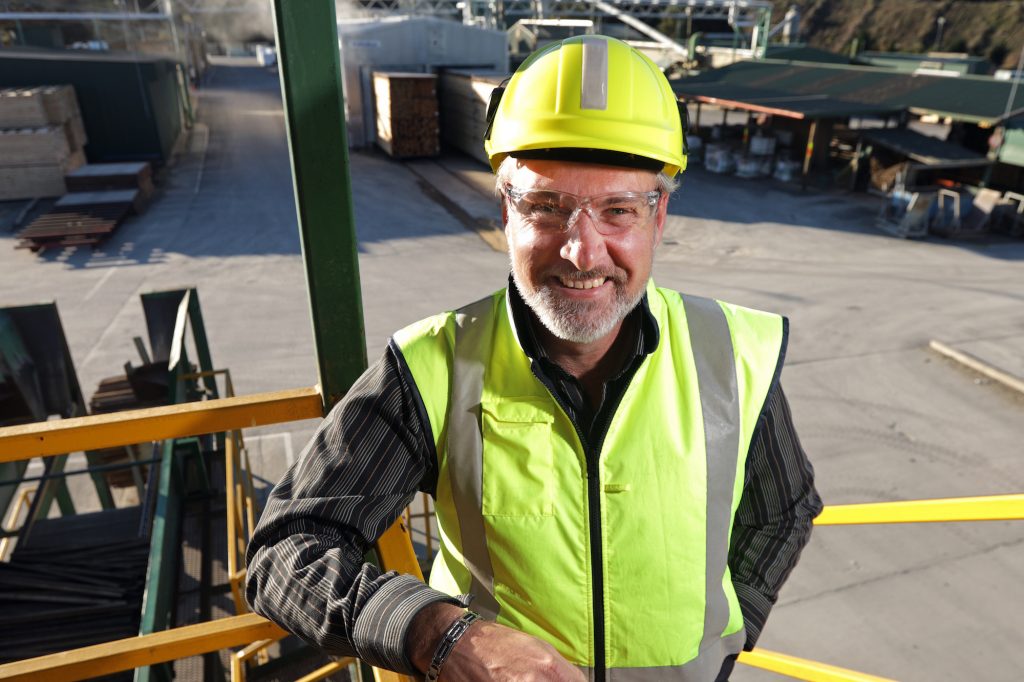
By Jacquie Walters, John Cohen-Du Four and Sandrine Marrassé | Photos by Tim Cuff and Karaena Vincent
Nelson Management Ltd (NML), the management company for Nelson Forests, has much to celebrate. Nelson Forests was recently acquired by Australian forest and timber processing company OneFortyOne (OFO) in a move that delighted NML’s management and the new owner alike and is already set to provide strong benefits to the Nelson Tasman and Marlborough communities. “It’s not a marriage but it feels like a match made in heaven,” says Lees Seymour, Managing Director of NML. “OFO understand our business and our culture and values are very alike.”
Chair of the OFO Board of Directors John Gilleland was in Nelson and Blenheim in September to celebrate the purchase settlement with NML staff and community representatives. “We want to be part of the local community,” says Gilleland. “It’s a wonderful forest and a wonderful mill. The trees will grow but everything else that happens is about the people. These are people who are leading the industry in terms of health and safety and innovation. OFO’s leadership team are innovators as well and they believe in this industry. Our investors believe in the asset and the community and their focus is on people and their governance will be in support of this business and of Lees as Managing Director.”
While OFO is an Australian company, its CEO Linda Sewell is a New Zealander with extensive senior management experience in the forestry industry, both here and in Australia. Sewell says she quickly recognised that Nelson Forests coming up for sale was a compelling opportunity for her fast-growing company. “This asset came at the right time for us and we were perceptive enough to recognise it and young enough to be entrepreneurial enough to seize the opportunity.”

Sewell maintains that the worst thing a new owner can do is to interfere with a company that’s already well managed and highly regarded. “The Nelson Forests brand is very strong here. We didn’t buy a business to fix, we bought a business to nurture and grow. So you won’t see much change on a day-to-day basis.”
To mark the milestone of the purchase settlement in early September, NML announced two significant initiatives that are set to have a positive impact in Marlborough and Nelson Tasman. The first is a $500,000 research fund, with $100,000 allocated per year for five years. Research will focus on the issue of sedimentation.
“We appreciate companies that want to invest in our district,” said Mayor of Blenheim John Leggett at the Blenheim event. “I understand the acquisition is OFO’s first outside Australia — we will certainly take that message out to the community. Timber and logging is a very, very important part of our local economy. As a council we’re very committed to working together to find best answers in terms of the environment. We pride ourselves on working constructively with this sector.”
“We realise that there is a high level of interest in forestry’s role in sedimentation and that our community is looking to us to proactively address this issue,” says Lees Seymour. “Research is crucial and will help us prevent, manage, and mitigate sedimentation. We need to be talking with our communities about how we build resilience to protect people’s structures and properties.”
Tracy Goss
Kaituna Sawmill has a new General Manager. Feilding born Tracy Goss made the move back home from the USA, after realising, like so many ex-pat families where one of the spouses is a New Zealander, that they wanted their children to grow up in New Zealand, in a beautiful part of the rural countryside where they’d enjoy the benefits of New Zealand schooling. With a number of months leading the Kaituna operation now under his belt, Tracy is delighted with where he and his family have landed.
“Truthfully, I couldn’t have asked for a better group of people to work with,” he says. “They’re highly intelligent and keen to get on with it. My views and my particular take on things are really listened to. I’m working with a fantastic team.”
Sedimentation research
Estate Value Manager for NML, Andrew Karalus, says that initial sedimentation research projects supported by the fund will be in collaboration with Dr Joanne Clapcott and Mark Newton from Cawthron Institute and Dr Les Basher from Manaaki Whenua – Landcare Research.
“Joanne is helping us design a monitoring strategy. We already do a lot of monitoring so Joanne’s research will be about ensuring we have information across the estate spatially and that the monitoring actually measures the condition of the values we want to protect and the effects we are having. Importantly, an additional part of her research will look at a long-term, ‘paired’ catchment monitoring strategy to see how effective our best practices are compared to not using them. This research will be conducted in Nelson and completed in adjoining catchments where soils and weather and topography are very similar so the results can be better attributed to the “method” or practices we employ. Over the next five years we will bring in new skills to review engineering structures for downstream protection and also review our best practice.
“Mark will help us work in communities to work out how we can minimise damage to downstream values, some of the work will be on our land and some will be downstream in other people’s land. Les’ initial work for us will identify relative risk both in terms of site potential or susceptibility for landslides and debris flow deposition zones, in other words, areas where land will fail and where the sediment and slash may end up.”
“It is debris flows that typically cause all the damage that makes the news,” says Dr Basher, “as they bring down not only the sediment, but also wood and logs. The risk analysis really starts with understanding the susceptibility to landslides, then bringing in the frequency of events that cause the erosion to occur, and then assessing the consequences.
“We’ve just had the national environmental standard for plantation forestry come into effect on the first of May. There’s an erosion susceptibility classification (ESC) as part of that but it’s pretty broad brush – it’s a national classification based on the best approach we could take at the time, but it’s quite limited at operational scale for the forestry companies. What we’re trying to do here is much more quantitative so it’s driven by data, and effectively what Nelson Forests are doing is a much more detailed analysis of erosion susceptibility than what the national standard provides for.
“We’ll collect information where landslides have occurred both historically and recently. NML also recently acquired LiDAR (a surveying method that uses laser pulsing) for its whole forest estate which gives it a very detailed representation of the ground surface including a lot of the old erosion that’s occurred. Once we’ve done the mapping of the erosion we’ll then relate the occurrence of erosion to the factors that drive it like slope, shape of the land, and the underlying geology and soils.
“NML is one of the few companies that’s starting to go down that route now but a lot of the forestry companies are going to have to probably. What we’re doing is something much more modern and more fit-for-purpose at operational scale than is available at national scale in the ESC.”

Apprenticeship programme
NML has also announced a new school leaver programme that will provide trade apprenticeships at its Kaituna Sawmill near Blenheim. Starting from next year, NML expects to offer up to four trade apprenticeships at one time at Kaituna Sawmill in a diverse range of vocations including fitter turner, electrician, saw doctor, timber processor, boiler operator, PLC (electronic automation) engineer, and timber machinist.
“We hope that this will provide a big step up for those school leavers keen to take up employment within the forest and wood products industry,” says Kaituna Sawmill General Manager Tracy Goss.
“This allows students to go into training straight away,” says James Ryan, Marlborough Boys College Assistant Principal, “enabling them to be brought into the workforce not as unskilled starters. They’ll have a lot of practical skills, theory, and knowledge they wouldn’t get any other way.”
Ryan notes that although Blenheim is a bustling township, and only twenty minutes’ flight from Wellington, it is still a rural community amongst farms and vineyards.
“So our students tend to focus more on practical based jobs,” he says. “Fewer will leave town to go to university – eighteen percent as opposed to the national average of thirty-six. Our region’s low unemployment rate has a lot to do with this.”
Ryan says between ten and fifteen percent of Marlborough Boys High graduates move into forestry and forestry-aligned jobs.
“Forestry is a real growth industry in Marlborough. It’s always been here and there’s always a need for more people working in it. The increases in plantings has seen an equivalent increased need for keen, capable, effective labour.
“We regularly have some fifty to sixty students in our high school forestry programmes, gaining on-the-job experience while still at school.”
The new three-year apprenticeships will offer practical training during the days, alongside theoretical learning in the evenings.
“Education is what underlies it,” Ryan says. “Once they’ve come to grips with the theory, the on-the-job work reinforces the learning, making it all much more concrete.
“Our leavers can currently join a silvicultural crew and work their way up through the industry,” he says. “But these new apprenticeships allow them to move up through the ranks much faster. As long as they have Level 2 NCEA, and are seventeen or eighteen years of age, they can consider the apprenticeship option.”
Ryan points out another plus with the apprenticeship scheme – it means there’s no gap between high school and further training. He believes that there’s less risk of distraction or loss of motivation when students make a seamless transition into workplace and training.
Ryan’s view is that next year will serve as the establishment phase for the apprenticeship scheme but that momentum will soon gather. “Soon enough word will get around that this is an exciting new opportunity for the kids,” he says.
“It’s very much part of the industry upskilling its workers, investing in its growth, and ensuring future safety. This opportunity from NML is a great boost.”
Mary-Jeanne Lynch, Principal/Tumuaki of Marlborough Girls’ College agrees. “This is a great opportunity for our school leavers to continue their learning in the workplace and be mentored and supported through their transition from school to work,” says Lynch. “It also provides the opportunity for students to have long-term careers in our local community.

“There are many different capabilities that girls can bring to the forestry industry. Our students have incredibly good skills in working with people, solving problems, leading teams … these are the skills that any employer, including the forestry industry, value and will support a young person to develop through their career pathway.”
Lynch says that Marlborough Girls College students are exploring a wide range of opportunities for when they leave school. “Traditionally we have had about 30 percent of our students head to University study, this is above the national average. The greater proportion of students move into other tertiary study and employment in local industries.
“Currently we are working with a number of local organisations to support our students to understand the wide range of workplace training and career opportunities in Marlborough.”
Students from the college are involved in trades-based learning at school and Lynch says that this leads on to apprenticeships in a variety of sectors including hairdressing, tourism, the equestrian industry and hospitality.
“We are working to ensure that girls understand there are really great work and career opportunities in areas that girls have not traditionally pursued.
This includes the forestry industry.”
She adds that students meeting people from a particular industry, including women who work in that industry, and being shown their workplace and having different types of training and potential career pathways are important ways of changing the perception that an industry such as forestry and timber processing might not be for them.
“This kind of mentoring is really effective in removing barriers for young women, especially in non-traditional careers such as forestry. We are also very keen to show our students that the forestry industry needs a wide range of skills and capabilities in their workforce, including project management, media and marketing, workforce management, and human resources.”

